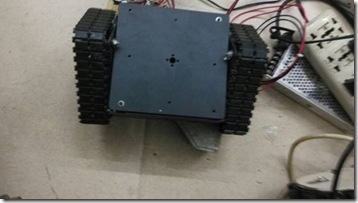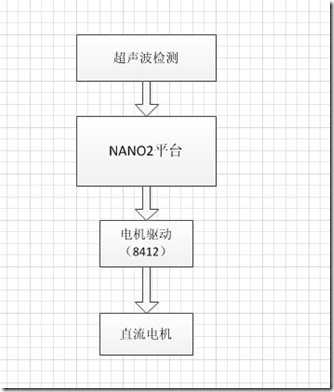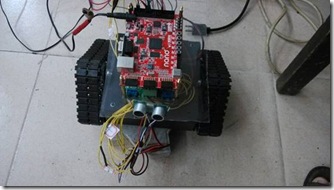【红色飓风Nano二代测评】小车动起来+超声波
0赞
发表于 4/6/2014 5:45:08 PM
阅读(4536)
给自己放了一天假,又投入到学习中了,之前一直在调试基于NANO2的机械臂控制,然而小车已经到了,迫不及待,果断先来动动小车来试试。
意外发现:在ise中,似乎在顶层模块中例化其他的子模块的时候,如果两个子模块的信号都连接到某个wire信号上,那么在顶层文件中必须要例化前申明这个wire信号,而在quartus中式不需要的,很诧异的一件事情。
小车:
开发环境:ise14.6,硬件平台:NANO2
实现思路:这次的实验仅仅是对小车运动速度和超声波的一个联用,一开始小车以固定速度行驶,当超声波检测到障碍物时(20-40cm会引起速度的改变,同时会使led亮),这里简单的将一个电机的速度将到很低,而一个电机的速度基本不变,这个小车就能避开障碍物了,当然,这仅仅是测试而已。
电机驱动器:这里采用TI的DRV8412来做直流电机的驱动器,因为是实验室现成的东西,用起来很方便。
FPGA设计:

顶层文件
`timescale 1ns / 1ps
//////////////////////////////////////////////////////////////////////////////////
// Company:
// Engineer:
//
// Create Date: 20:41:24 04/04/2014
// Design Name:
// Module Name: motor_sonic
// Project Name:
// Target Devices:
// Tool versions:
// Description:
//
// Dependencies:
//
// Revision:
// Revision 0.01 - File Created
// Additional Comments:
//
//////////////////////////////////////////////////////////////////////////////////
module motor_sonic(
input clk,
input rst_n,
input echo,
output trig,
output pwm_a,
output pwm_b,
output pwm_c,
output pwm_d,
output led
);
wire [9:0]speed_motor1,speed_motor2;
wire [23:0]distance;
ultrasonic u1(
.clk(clk),
.rst_n(rst_n),
.echo(echo),
.trig(trig),
.led(led),
.distance(distance)
);
pwm u2(
.clk(clk),
.rst_n(rst_n),
.speed(speed_motor1),
.pwm_1(pwm_a),
.pwm_2(pwm_b)
);
pwm u3(
.clk(clk),
.rst_n(rst_n),
.speed(speed_motor2),
.pwm_1(pwm_c),
.pwm_2(pwm_d)
);
//reg [9:0]speed_temp1,speed_temp2;
assign speed_motor1=((distance>=24'd20)&(distance<=24'd40))?250:300;
assign speed_motor2=((distance>=24'd20)&(distance<=24'd40))?150:300;
endmodule
超声波检测:
`timescale 1ns / 1ps
//////////////////////////////////////////////////////////////////////////////////
// Company:
// Engineer:
//
// Create Date: 18:52:06 04/02/2014
// Design Name:
// Module Name: ultrasonic
// Project Name:
// Target Devices:
// Tool versions:
// Description:
//
// Dependencies:
//
// Revision:
// Revision 0.01 - File Created
// Additional Comments:
//
//////////////////////////////////////////////////////////////////////////////////
module ultrasonic(
input clk,
input rst_n,
input echo,
output trig,
output led,
output [23 : 0] distance
);
//产生周期60ms,10us脉冲的触发信号trig,clk为50M
reg [21:0]cnt;
always @(posedge clk)
begin
if(!rst_n)
cnt<=0;
else if(cnt==22'd2999999)
cnt<=0;
else
cnt<=cnt+1'b1;
end
assign trig=((cnt>=22'd100) & (cnt<=22'd599)) ? 1:0;
//测量echo的长度
reg echo_reg1,echo_reg2;
wire start,finish;
always @(posedge clk)
begin
if(!rst_n)
begin
echo_reg1<=0;
echo_reg2<=0;
end
else
begin
echo_reg1<=echo;
echo_reg2<=echo_reg1;
end
end
//这里还不完善,外一有扰动就悲剧了
assign start=echo_reg1 & (~echo_reg2); //捕捉上升沿
assign finish=(~echo_reg1) & echo_reg2; //捕捉下降沿
//测量从start到finish这段时间
reg [23:0]distance_cnt;
reg [23:0]distance_temp;
parameter idle=2'b00;
parameter state1=2'b01;
parameter state2=2'b10;
reg [1:0]state;
always @(posedge clk)
begin
if(!rst_n)
begin
state<=idle;
distance_cnt<=0;
distance_temp<=0;
end
else
begin
case(state)
idle: begin
if(start)
state<=state1;
else
state<=idle;
end
state1: begin
if(finish)
state<=state2;
else
begin
distance_cnt<=distance_cnt+1'b1;
state<=state1;
end
end
state2: begin
distance_cnt<=0;
distance_temp<=distance_cnt;
state<=idle;
end
default: state<=idle;
endcase
end
end
//根据公式 us: 20*distance_temp/1000,分母为58,总的来说就是 s=distance_temp/2900,调用ip核
wire [11:0] divisor; //除数
assign divisor=12'd2900;
wire [11 : 0] fractional; //省去
wire rfd;
//除法器例化
div div (
.clk(clk), // input clk
.rfd(rfd), // output rfd ready for data和ip核设置有关,这里没什么关系
.dividend(distance_temp), // input [23 : 0] dividend
.divisor(divisor), // input [11 : 0] divisor
.quotient(distance), // output [23 : 0] quotient
.fractional(fractional)); // output [11 : 0] fractional
//led指示状态,20-40cm认为是有障碍物
reg led_state;
always @(posedge clk)
begin
if(!rst_n)
led_state<=0;
else if((distance>=24'd20)&(distance<=24'd40))
led_state<=1;
else
led_state<=0;
end
assign led=led_state;
endmodule
pwm模块
`timescale 1ns / 1ps
//////////////////////////////////////////////////////////////////////////////////
// Company:
// Engineer:
//
// Create Date: 20:51:36 04/04/2014
// Design Name:
// Module Name: pwm
// Project Name:
// Target Devices:
// Tool versions:
// Description:
//
// Dependencies:
//
// Revision:
// Revision 0.01 - File Created
// Additional Comments:
//
//////////////////////////////////////////////////////////////////////////////////
module pwm(
input clk,
input rst_n,
input [9:0] speed,
output pwm_1,
output pwm_2
);
always @(posedge clk)
begin
if(!rst_n)
cnt<=0;
else
cnt<=cnt+1'b1;
end
reg [9:0]cnt;
assign pwm_1=(cnt<=speed)?1:0;
assign pwm_2=0;
endmodule
视频链接:
http://v.youku.com/v_show/id_XNjk1MjQwOTY4.html
说明:因为在FPGA中取好了障碍物在20-40的时候才会引起电机的速度变化。
做到这里,觉得自己的某些能力是比较差的,比如是无法把东西弄的漂漂亮亮,还有没有电池,都不敢把电机放在地上跑,只能用砖来垫起来,还是就是机械手到时候放哪里呢?这些都是一个头疼的问题,不知道到时候小车项目能不能做完,实现既定的功能。不管怎么样,现阶段还是把机械手控制调好,上位机写好,还有一段路要走啊。




